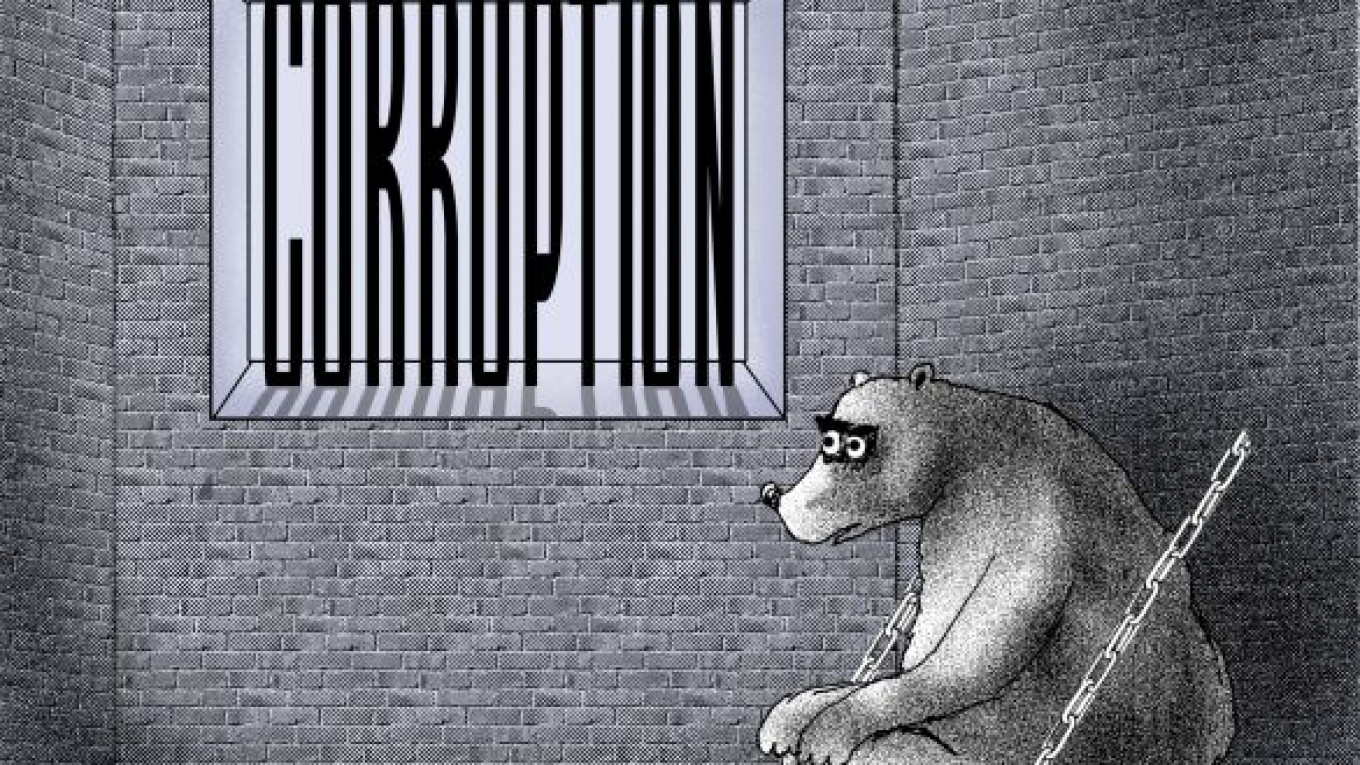Corruption, something never far from thought in Russia, recently has been attracting even more attention than usual. Senior Russian officials, including President Dmitry Medvedev, foreign politicians such as U.S. Vice President Joe Biden, and Russian opposition figures have made the issue a point of special focus.
Rhetorical exhortations to tackle deepening corruption seemingly have become part of ritual in Russia. Identification of this glaring problem, however, has not lead to measures to successfully address it. Indeed, a decade into the "vertical of power" governance model forged by Vladimir Putin and now maintained in tandem with Medvedev, Russia's entire institutional apparatus — including the judiciary, law enforcement agencies, security services and news media — conspires to enable state-led corruption.
With Middle East authoritarians coming under greater pressure and in some cases giving way, Russia's vast corruption is now especially conspicuous. The former Soviet states, Russia included, suffer from many of the institutional weaknesses found in the Arab world, including substandard governance and accumulation of economic power around ruling elites.
Meaningful governance reforms have yet to be achieved under Russia's current leadership. If anything, institutional accountability has been eroded over the Putin years. Media and judicial independence have been reduced along with virtually all other voices critical of the authorities.
While the need for serious reform is abundantly clear, its prospects are dimmed by the reality that Russia's authoritarian system has adapted in important ways over the past decade and grown deep roots. It contains governance habits of Soviet vintage, such as a dominant executive, obedient judiciary and opaque and arbitrary administrative decision making.
At the same time, the system now includes features forged by the new Russian leadership in an environment with far more economic openness and international integration than during the Soviet period. Russia's post-Soviet authoritarian rulers have come to understand that allowing a degree of private enterprise and commercial opportunity extends the patience of its public, while expanding the opportunities for graft and personal enrichment.
In the immediate term, Russia's windfalls from rising oil prices will likely have the effect of postponing reforms even more. The Kremlin may be tempted to follow the course of Saudi Arabia, which reached deeply into its own windfalls recently to distribute billions of dollars in social benefits to ease the pain of inflation and unemployment and avert the popular unrest that has spread across the Arab world.
There are no easy answers for initiating reform in Russia. The United States and European Union, for their part, can address these problems by showing more resolve in their policies. Policymakers in the trans-Atlantic community have been too quick to place democratic rights and good governance on a back burner when pursuing economic or security cooperation with authoritarian regimes.
A good start would be reinvigorated efforts to safeguard press freedom, which is integral for governmental and market transparency. A free press represents a critical anti-corruption tool but is seen by Russian leadership as a threat rather than a benefit.
Stronger efforts should also be made to hold the Russian authorities to their electoral process, beginning with registration of parties. Such steps are no panacea, but in a political environment that increasingly operates without institutional accountability, these would represent an important, and achievable, place to start. Such reform steps are essential because Russia's track record indicates that economic opening without political reform simply feeds kleptocratic authoritarian institutions, giving rulers the wherewithal to tighten their grip on their own populations.
Recent developments in the Arab world are among other things a visible reminder of the limits of authoritarianism. The non-Baltic former Soviet Union, Russia included, performs on average at the level of the Middle East on political rights. Irrespective of geography, recent developments suggest authoritarian governments would appear to be entering a higher risk pool.
With a year to go until the presidential election, it is doubtful whether the Russian system can successfully reform and make headway against the swelling corruption scourge that eats at the fabric of society.
Another six years, or more, of Putinism — whether expressed as a duet or a solo act — would run the risk of consigning Russia to a fate like those of the ossifying Arab world, where presidential tenure is measured in decades rather than years, and the postponement of reform only intensifies the need for it.
Christopher Walker is director of studies at Washington-based Freedom House. This article is adapted from a longer essay that appears in Corruption °C, a journal published by Providus, a Riga-based think tank.
A Message from The Moscow Times:
Dear readers,
We are facing unprecedented challenges. Russia's Prosecutor General's Office has designated The Moscow Times as an "undesirable" organization, criminalizing our work and putting our staff at risk of prosecution. This follows our earlier unjust labeling as a "foreign agent."
These actions are direct attempts to silence independent journalism in Russia. The authorities claim our work "discredits the decisions of the Russian leadership." We see things differently: we strive to provide accurate, unbiased reporting on Russia.
We, the journalists of The Moscow Times, refuse to be silenced. But to continue our work, we need your help.
Your support, no matter how small, makes a world of difference. If you can, please support us monthly starting from just $2. It's quick to set up, and every contribution makes a significant impact.
By supporting The Moscow Times, you're defending open, independent journalism in the face of repression. Thank you for standing with us.
Remind me later.






